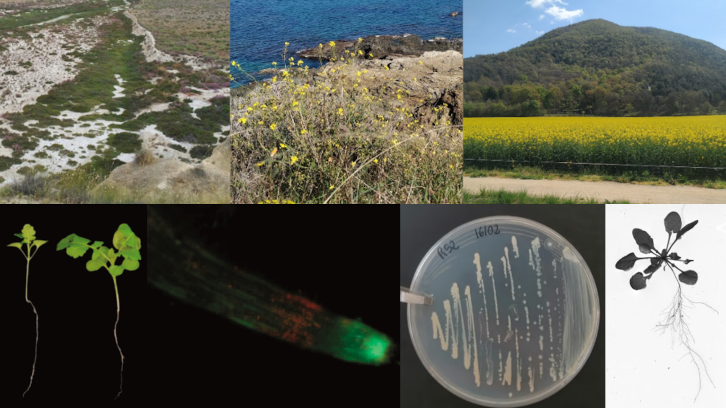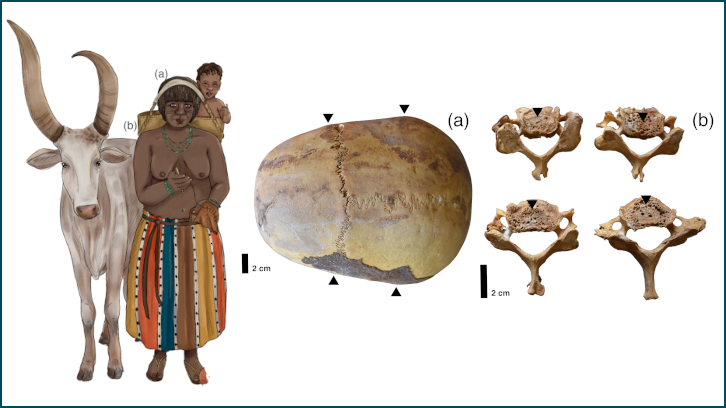Unfavorable Soils, Innovative Solutions: Plant Adaptation and Beneficial Microbiomes

Catalan soils are deteriorating due to both natural factors and human activities, leading to nutrient depletion and increased alkalinity and salinity, which reduce their suitability for cultivation. In response to this challenge, the Plant Physiology group of UAB investigates the tolerance mechanisms of plant species to these adverse conditions, as well as the beneficial interactions between plants and microorganisms that enhance them.
Cultivated soils in Catalonia face various challenges resulting from both natural factors and human activities. Mediterranean climate and geology, exacerbated by climate change and inadequate agricultural practices, contribute to soil degradation, making it less suitable for farming. Besides water scarcity, major limitations include a lack of essential nutrients, high alkalinity, and salinity. These factors not only reduce crop yields but may also affect food and forage quality and long-term sustainability. In response, the UAB Plant Physiology group is developing two strategic approaches to enhance plant species' tolerance to these constraints.
One approach, led by researchers Poschenrieder and Busoms, focuses on studying the tolerance mechanisms of wild Brassicaceae species adapted to saline soils (e.g., Busoms et al., 2021; 2024), alkaline soils (e.g., Busoms et al., 2023; Pérez-Martín et al., 2024), and saline-alkaline soils (Pérez-Martín et al., 2022; Almira-Casellas et al., 2022; 2024). In one of their most recent publications, the authors show that in Arabidopsis thaliana tolerance to carbonate-rich (alkaline) soils is associated with a rapid hyperpolarization of the cell membrane and a specific increase in the expression of a carbonic anhydrase (βCA4), along with other genes involved in water and CO₂ transport, apoplast acidification, and iron (Fe) uptake (Pérez-Martín et al., 2024). However, they also observed that the molecular adaptation mechanisms that allow plants to tolerate either saline or alkaline soils are not always useful—and may even be detrimental—when plants must face the combined stress of saline-alkaline soils. For instance, when comparing different natural populations of A. thaliana, the researchers found that plants with no prior adaptation to alkaline soils have difficulty absorbing and efficiently utilizing Fe internally. This limitation reduces their photosynthetic capacity, thereby decreasing the amount of carbon available for growth and specialized functions, ultimately making them less capable of surviving in saline-alkaline conditions. Interestingly, some populations that were not specifically adapted to either saline or alkaline soils still showed tolerance to combined stress. A gene expression analysis of these populations allowed researchers to identify candidate genes and metabolic pathways involved in these tolerance responses (Almira-Casellas et al., 2024).
The second approach, led by researchers Bianucci and Busoms, focuses on studying beneficial plant-microbe interactions to determine which tolerance mechanisms to abiotic stress are activated when plants are inoculated with native soil microorganisms. In particular, the team observed that environmental conditions play a key role in shaping microbiome diversity, identifying specific bacterial taxa in microbiomes from saline soils (Escolà et al., 2025). This study also showed that inoculating sensitive Brassica fruticulosa plants with a microbiota adapted to saline soils promoted plant growth under both control and saline conditions. These plant-microbe interactions help reduce oxidative stress caused by salinity and improve the uptake of essential nutrients such as phosphorus and iron. Some of the key contributors to this improvement are plant growth-promoting bacteria (PGPB). For this reason, the researchers focused on isolating PGPB from this saline microbiota. Out of 113 isolates, 26 were able to tolerate high salt concentrations, solubilize phosphate, and produce siderophores, but only 5 successfully promoted plant growth when inoculated individually. These five PGPB strains are therefore proposed as potential candidates for developing eco-friendly bioinoculants in the near future.
The study of these candidate strains, however, did not stop there. Researchers sought to determine whether seed inoculation with two of these PGPB strains (T7 and E1) could also improve the growth of different crop species (rapeseed, white mustard, and sweet alyssum) under saline conditions (González-Cobo et al., 2024). These three species were selected for their economic and environmental relevance: rapeseed (Brassica napus) is essential for biofuel production, an alternative to fossil fuels; mustard (Sinapis alba) is an expanding crop in both Catalonia and Europe; and sweet alyssum (Lobularia maritima), a native ornamental plant, is widely used in parks and gardens with limited water availability or in coastal areas. The study demonstrated that the T7-mustard and E1-rapeseed interactions were particularly beneficial, especially under saline stress. Results indicated that enhanced root development and growth in inoculated plants played a key role in improving crop performance. However, the study also revealed that plant-microbe-stress interactions are highly specific. For instance, the bacterial strain that promoted mustard growth had an inhibitory effect on rapeseed. These findings highlight the need for further research to better understand these interactions before they can be effectively applied in agriculture.
In summary, these studies open new avenues for improving crop resilience in degraded soils affected by salinity and alkalinity, whether through the selection of more tolerant varieties or the application of bioinoculants developed from beneficial microorganisms.
Department of Animal Biology, Plant Biology and Ecology
Plant Physiology Group
Universitat Autònoma de Barcelona
References
Escolà, G.; Bollmann-Giolai, A.; Giolai, M.; Malone, J.; Yant, L.; Poschenrieder, C.; Bianucci, E.; Busoms, S. (2025) Rhizosphere microbiome and plant growth promotion bacteria isolates enhance salinity tolerance in salt-sensitive Brassica fruticulosa. Under review, preprint at Authorea. https://doi.org/10.22541/au.174124680.05965302/v1
González-Cobo, C.; Escolà, G.; Tolrà, R.; Llugany, M.; Poschenrieder, C.; Bianucci, E.; Busoms, S. (2024) Seed inoculation with halotolerant strains enhance Brassicaceae seedling establishment under saline conditions. Agriculture, 14(12), 2184. https://doi.org/10.3390/agriculture14122184
Pérez-Martín, L.; Almira, M. J.; Estrela¿Muriel, L.; Tolrà, R.; Rubio, L.; Poschenrieder, C.; Busoms, S. (2024) A role for root carbonic anhydrase βCA4 in the bicarbonate tolerance of Arabidopsis thaliana. Physiologia Plantarum, 176(6), e70026. https://doi.org/10.1111/ppl.70026
Almira-Casellas, M.; Busoms, S.; Pérez-Martín, L.; Escolà, G.; López-Valiñas, Á.; Garcia-Molina, A.; Llugany, M.; Poschenrieder, C. (2024) At the core of salinity: Divergent transcriptomic responses to neutral and alkaline salinity in Arabidopsis thaliana. Environmental and Experimental Botany, 228, 105982. https://doi.org/10.1016/j.envexpbot.2024.105982
Busoms, S.; da Silva, A. C.; Escolà, G.; Abdilzadeh, R.; Curran, E.; Bollmann-Giolai, A.; Bray, S.; Wilson, M.; Poschenrieder, C.; Yant, L. (2024) Local cryptic diversity in salinity adaptation mechanisms in the wild outcrossing Brassica fruticulosa. Proceedings of the National Academy of Sciences, 121(40), e2407821121. https://doi.org/10.1073/pnas.2407821121
Busoms, S.; Pérez-Martín, L.; Terés, J.; Huang, X. Y.; Yant, L.; Tolrà, R.; Salt, D.; Poschenrieder, C. 2023. Combined genomics to discover genes associated with tolerance to soil carbonate. Plant, cell & environment, 46(12), 3986-3998. https://doi.org/10.1111/pce.14691
Almira-Casellas, M.; Pérez-Martín, L.; Busoms, S.; Boesten, R.; Llugany, M.; Aarts, M.; Poschenrieder, C. (2022) A genome-wide association study identifies novel players in Na and Fe homeostasis in Arabidopsis thaliana under alkaline-salinity stress. Plant Journal, tpj.16042. https://doi.org/10.1111/tpj.16042
Pérez-Martín, L.; Busoms, S.; Almira-Casellas, M.; Azagury, N.; Terés, J.; Tolrà, R.; Poschenrieder, C.; Barceló, J. (2022) Evolution of salt tolerance in Arabidopsis thaliana on siliceous soils does not confer tolerance to saline calcareous soils. Plant and Soil, 1-21. https://doi.org/10.1007/s11104-022-05439-9
Busoms, S.; Terés, J.; Yant, L.; Poschenrieder, C.; Salt, D. (2021) Adaptation to coastal soils through pleiotropic boosting of ion and stress hormone levels in wild Arabidopsis thaliana. New Phytologist, 232, 208-220. https://doi.org/10.1111/nph.17569


